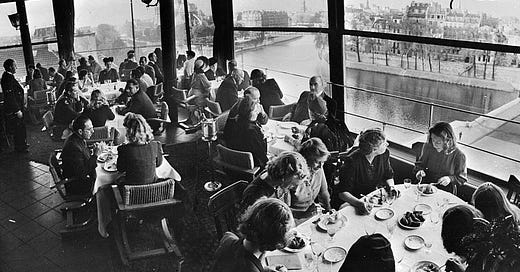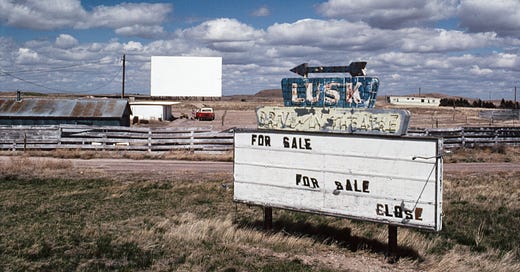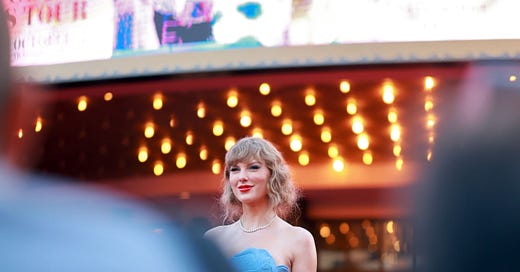
Until very recently, it was against the law to eat lunch at your desk in France. The reasoning was straightforward and endured for more than a century: eating in the workplace is hazardous to your health. Granted, in 1894, when this particular section of the code du travail was first implemented, the goal was to get people out of workplaces filled with toxins. But the idea stuck, and commerce and habits gradually adapted to it, providing lunch options up and down the price scale. You could get something «à emporter» (to go), like the ubiquitous baguette sandwich, and eat it in the parks that are truly around every other corner, or you could go to a cafe or brasserie and get the set menu for the day, with or without a glass of wine.
Before the pandemic, more than 50% of French workers sat down at a table for a full meal; across classes and employment types, the average work lunch lasted a full hour. (By contrast, only 20% of workers in the United States and the UK sat down for lunch, a number that frankly strikes me as high).
It wasn’t always this way in France— in fact, up until the late 19th century, most workers either went home for lunch or, when factory work made it impossible, brought their lunches with them. But it soon became clear that laborers had to get away from their work, because its chemical byproducts were making them physically ill. The lunch break provided the opportunity for a “flush” that, however temporarily, cleared toxins from the space.
Today, there are far fewer physical hazards connected to the workplace. But eating at one’s desk is still hazardous. It normalizes a form of “grazing” productivity culture in which workers program themselves to always be working in some form, but rarely actually achieving any form of concentration or deep work.
In truth, the desk-lunch is counter-productive. It makes us worse at our jobs, worse coworkers, more individualistic, and more exhausted. If we understand burnout as an occupational hazard, then it’s time to consider how we can protect ourselves against the desk lunch — both the sad, limp experience itself, but also all it represents.
I think I lost my lunches when I started grad school. That sounds like someone took them from me, or that I simply misplaced them, but I did it to myself. Or, more precisely, my broken productivity brain did it to myself. It makes sense: grad school was the period when I lost any sort of delineation between working and not working, when my understanding of a healthy attitude towards work (work, then don’t work for a bit!) was supplanted by the toxic one (work: all the time!) I’ve been attempting to unlearn ever since.
I’d end up on campus for the day and god forbid I’d actually spend money on something like a sandwich. So I’d pack a Clif Bar, two pieces of fruit, plus maybe one of those crumbly Nature Valley granola bars in my backpack, and I’d eat it while reading a journal article for seminar, or grading a comp paper, or walking the half mile between classes on the University of Texas campus. It was joyless, mindless, totally in service of that overarching grad student goal of unceasing, if increasingly inefficient, work.
When, nearly a decade later, I began work at BuzzFeed, I marveled at the free lunches (Monday, Wednesday) and avalanches of snacks. I wasn’t naive enough to understand them as some sort of benevolence — even that early in my career, I understood the free food, like the pingpong machine and weekly happy hours, were a means of addicting me to the office and, by extension, keeping me there as much as possible.
In the early days, back when BuzzFeed had yet to truly expand, employees from all corners of the site would come together in line for heaping piles of tacos or Korean BBQ or whatever was on the menu, clustering around cheap plastic tables and chairs in what was referred to as the canteen. Most of us had pretty fucked up relationships with our work, but we nonetheless took that time. It felt like a laugh break, like an intermission.
But as BuzzFeed further professionalized — and eventually moved into a brand new BuzzFeed-designed office space, complete with four floors and a cavernous, echoing new version of the canteen — the impetus to eat together began to fade. Or, at the very least, mine did. I was traveling more for reporting, working more and more hours in the lead up to the 2016 election and its aftermath. When we had lunch available in the office, I’d grab it and return immediately to my desk. When we didn’t, I’d make a meal out pita chips, carrots, and hummus — or, if I felt particularly rich, would spring for a sad desk salad.
When I moved to Montana (and later, during the pandemic) my lunch habits regressed to quasi-grad-school levels. I rarely forgot to eat; I just ate while reading a blog that never fails to slightly annoy me but I can’t stop reading, or checking Covid stats for the 15th time that day, or responding to something on Slack. I wasn’t eating while working so much as eating while LARPing. I thought I was being more productive. Or maybe I just didn’t know how to turn off the part of me that conceived of time not working as time lost instead of time gained. To step away felt vertiginous, unstable. Why did shoveling Triscuits in my mouth while scrolling Twitter feel better?
I’ve spent a lot of time over the last few years advocating for the general idea that more work does not necessarily make better work. There are diminishing returns to productivity culture, and work will expand to fill whatever parcel of time you give it. When you shorten the work day or the work week — or mandate paid time off for rest and rejuvenation — you end up with workers who are more resilient, both intellectually and physically. Creativity, innovation, precision, perception — so many of the characters that are fundamental to a job well done — become elusive without resting the body and the mind.
And yet: so many of us salaried and freelance workers, people who are very smart and often logical, have convinced ourselves that wringing those few more minutes of work during lunch will somehow ratchet our productivity capabilities to 11. And I’m here to tell myself and all of you: we are full of it.
In 2021, prompted by Covid concerns, the French government rescinded the workplace lunch ban. I was in Paris this past week for a conference, and I noticed that there are a few places that seem modeled on the American grab-and-go-back-to-your-desk model: poke places, for example, seem to have proliferated. But the lunch out remains alive and well. If my memory of the New York streets at lunch time is the slightly upmarket paper back intended to tote an order of Dig Inn or Chipotle back to the office, then the Parisian memory is street after street of cafes, overflowing with people of all ages, lingering with their lunches — and seldom alone.
My intention here is not to romanticize French working culture (there are plenty of ways in which France is still figuring its shit out, and plenty of additional regulations that, as we discussed at length in Out of Office, are poorly-designed). But it’s important to repeatedly highlight other modes of approaching the rhythms of life and work. They exist! They’re right fucking there!
And yes, the French GDP is not as large as that of the United States — it’s only the seventh in the world. But I can’t be the only one thinking: all this GDP fetishism, and for what? Is the GDP the actual indication of a psychologically and physically healthy country? Or is this continued fixation against the backdrop of so much societal and personal suffering yet another sign of a nation in decline?
Sure, the United States produces a lot. We have “national wealth,” which allows many of us to buy more things, largely on some form of credit, and experience a higher standard of living — and many others to live constantly on the knife edge of the poverty line, if not plunging below it. We are “better off” on paper than France. But are we?
This isn’t really about lunch, of course. It’s about the continued erosion of boundaries around the few things in our lives that were once sacrosanct. It’s about work becoming ever more slippery and our non-work lives becoming ever more porous. And it’s about other people, too.
In the wake of the 2021 office lunch ban recension, food historian Martin Bruegel made an impassioned case for the historical and contemporary purpose of the desk lunch ban. He argues that a shared meal, the time and presence it requires, functions as a sort of “rampart” (what, in Out of Office, we refer to as a guardrail) to protect against “the continued attempts to individualize workers and citizens in order to weaken their capacity to campaign for democratic solutions to our problems — from inequality to climate change and issues relating to the working environment.”
In other words, the shared lunch is a solidarity builder. Which might be why some companies attempting to lure workers back to the office have focused far more on the food component and far less on the lunch break. Quite frankly, they’re missing the point. If you want better company culture, if you want more empowered workers, if you want to protect against burnout — then you should care less about the office itself and more about the spaces you’re facilitating in your employees’ workday.
In the Harvard Business Review, Ruchika Tulshyan writes that in Singapore (which, pre-pandemic, had a lunch culture similarly robust to the one in France) some workers who remain remote have nonetheless taken to scheduling weekly lunches with their teams. If your team is more distributed, you can still hang out together while eating lunch remotely — just close Slack and Outlook and Teams and Gmail entirely.
Tulshyan also argues that leaders should model lunch breaks the way they should model taking actual time off: with consistency, without bullshit (e.g., not just blocking it on your calendar and working anyway), and by talking about it a lot: not as something you get to do because of your seniority, but something that everyone should do, even in their first weeks, because it’s the way you do things.
I work for myself, but I don’t want the sad desk lunch to be the way I do things. So I’m going to use the summer to experiment with a real, daily pause for lunch — and I’m going to use the Culture Study Discord to keep myself (and anyone else who wants to join me) accountable. You can eat with yourself outdoors, with your kid while actually talking to them, with your coworkers in or out of the office, with the friend that you’re co-working with, or with your parent. What matters is that you’re doing it while not working — ideally, without screens at all — and reclaiming the rest that is rightfully yours.
At some point in our not so distant past, we collectively decided that people shouldn’t die, be grievously injured, or suffer longterm health side effects due to their line of work. With the political might of unions and the labor movement, we passed laws to enshrine that belief, and while their enforcement has never been perfect, and certain jobs require risking one’s life on a daily basis, those laws spoke to the same understanding: that life is holier than profit. As the character of work has changed, our legislation has failed to keep pace with the new and varied challenges to that belief. We can claw back our own lunch time, but it’s not enough to fight the ongoing degradation of the right and ability to rest across industries.
We need plans, and we need power, and we need solidarity. We need to go to fucking lunch.
There’s a (free!) CS member-led author talk on worker organizing this Thursday. Journalist Nell McShane Wulfhart and a Delta flight attendant currently organizing with the AFA will talk about the history and relevance of organizing in the airline industry (did you know the concept of "emotional labor" was coined in reference to stewardesses?). All attendees get a free copy of Nell's new book via Reparations Club.
Wanna join me in Lunch Accountability in the Discord? Looking for this week’s Things I Read and Loved? Become a Paid Subscriber!
Subscribing is how you’ll access the heart of the Culture Study Community. There’s those weirdly fun/interesting/generative weekly discussion threads plus the Culture Study Discord, where there’s dedicated space for the discussion of this piece, plus equally excellent threads for Gardening/House Plants, Job Hunting, Zillow-Browsing, Bikes-Bikes-Bikes, Nesting and Decorating, Puzzle Swap, Home Improvement/DIY, Running is Fun????, Advice, Ace-Appreciation, Books Recs, Home Cooking, SNACKS, or any of the dozens of threads dedicated to specific interests, fixations, obsessions, and identities.
If you’ve never been part of a Discord: I promise it’s much easier and less intimidating than you imagine.
As always, if you are a contingent worker or un- or under-employed, just email and I’ll give you a free subscription, no questions asked. If you’d like to underwrite one of those subscriptions, you can donate one here.
If you’re reading this in your inbox, you can find a shareable version online here. You can follow me on Twitter here, and Instagram here — and you can always reach me at annehelenpetersen@gmail.com.

















I'm a full-time university instructor with about 430 students per semester, and a part-time illustration business. I've been taking real meal breaks when I'm on campus for about a year. It's mostly a good thing, but it's also very different from the group meals you describe.
On campus, my meal breaks (usually dinner, rather than lunch) are aggressively private. There's always a closed door between me and everyone else, and some sort of relaxing entertainment (like an audiobook, a podcast or a feed full of cat rescue videos) on the table next to me. Grading, emailing and class prep are NOT allowed. Most of the time, it's exactly what I need between my afternoon studios and my evening lectures.
Eating with coworkers exhausts me. This is partly because I am a fat person who gets a lot of scrutiny when I eat. I'm also a diabetic who makes all of my own meals, so I'm the odd one out when we go to a restaurant (if they'll let me eat my own food at all) or order take-out.
Because I have so many students, there's a very good chance that I will bump into at least one person who needs help with a class. I don't like turning people away when they ask for help, especially in large classes, where students are already reluctant to talk with their instructors. If I help them, my dinner break turns into a working dinner. We already know how unhealthy that is.
And of course there are coworkers with poor boundaries. As an Instructor, I am near the bottom of the faculty hierarchy. For folks at other schools, I think I'm in "Lecturer" territory. There are weird power dynamics in play whenever I tell someone "I'm taking a dinner break. Let's talk about this later." I'd rather skip that whenever I can.
Anyway, I love my real dinner breaks. But I see them as chances to rest, rather than opportunities for solidarity.
I’ve been very fortunate to work at organizations — all nonprofits, surprisingly enough — that had a strong tradition of taking lunch away from your desk. At one place, we would all gather at 1 pm and lunch together as a staff; at another, everyone would head out into the city around noon every day either to eat or take a walk or run errands — sometimes alone, sometimes in small groups. It made for a much more pleasant and productive work environment.
In contrast, at my current workplace, everyone eats at their desks — despite the fact that we have a full eat-in kitchen on our floor. When I first started I would sit in the kitchen to eat my sandwich, but every single person who walked by made some sort of snide comment that “it must be nice” to have the time to step away from my desk every day. As I really hate eating at my desk I ended up finding a place outside where I could take my lunch away from the prying eyes of the peanut gallery. It’s sad.